The Practical Works of the Rev. Richard Baxter (23 vols.)
Digital Logos Edition
Overview
The Practical Works of the Rev. Richard Baxter contains the treatises, sermons, and works of one of Puritan England’s most prolific writers and most influential preachers. Richard Baxter preached theological unity during a century of schism, and advocated mutual respect within the church during a period of intense religious warfare. He wrote with the conviction that theology should always be connected with both Christian ethics and human experience. This makes Baxter well-equipped to offer sage advice on practical Christian matters, such as worship, devotions, parenting, education, and relationships.
The writings, sermons, treatises, and other works contained in The Practical Works of the Rev. Richard Baxter have remained in print for centuries. Logos is pleased to offer the 23-volume academic standard originally published by Paternoster in 1830, which also includes a book-length biography of Baxter by William Orme. The Practical Works of the Rev. Richard Baxter includes Baxter’s 4-volume Christian Directory, his famous Reformed Pastor, and perhaps the most influential evangelical work of the seventeenth century, A Call to the Unconverted to Turn and Live. This collection also includes Baxter’s sermons, hymns, apologetic works, and numerous other theological treatises and biblical expositions.
This title is included in the following collections
You can save when you purchase this product as part of a collection.
Logos 8 Reformed Silver Legacy...
$349.99$349.99Logos 8 Reformed Gold Legacy L...
$849.99$849.99Logos 5 Reformed Gold Legacy L...
$849.99$849.99Puritan Ultimate Collection (1...
$1,099.99$1,099.99
- $1,499.99
- $1,499.99
- $1,499.99
- $1,499.99
- $1,499.99
- $1,999.99$1,599.99
- $2,999.99$2,249.99
- $3,499.99$2,799.99
- $2,999.99
- $2,999.99
- $2,999.99
- $2,999.99
- $2,999.99
- $2,999.99
- $2,999.99
- $2,999.99
- $2,999.99
- $4,749.99$3,562.49
- $4,749.99
- $4,749.99
- $4,749.99
- $4,749.99
- $4,749.99
- $4,749.99
- $4,749.99
- $4,749.99
- $12,102.39$7,299.99
- $11,399.99
- $11,399.99
- $23,999.99$17,999.99
- $21,749.99
- $24,999.99

- All of Baxter’s works, including the 4-volume Christian Directory, The Reformed Pastor, and A Call to the Unconverted to Turn and Live
- William Orme’s biography of Baxter
- Chronological index of Baxter’s works
…The most prominent English churchman of the 1600s.
—Christian History, a magazine affiliated with Christianity Today
…We must learn from the Puritan pastor Richard Baxter…to redouble our efforts to find strength from spiritual joy.
[Baxter’s] words have hands and feet. They climb all over you; they work their way into your heart and conscience, and will not be dislodged.
Look at Richard Baxter… what a flashing diamond was he! Even swearers on the ale-bench could not but know that he was a heaven-born spirit.
I was greatly refreshed to find what a sweet savor of good Mr. Baxter’s doctrine, works, and discipline remain to this day.
- Title: The Practical Works of the Rev. Richard Baxter
- Author: Richard Baxter
- Publisher: Paternoster
- Volumes: 23
- Pages: 13,323

Volume One contains A Life of the Author and a Critical Examination of His Writings, a lengthy biography by Rev. William Orme. The first part of the biography covers the life of Richard Baxter, such as his childhood years, his education, his wrestling with doubt, and his forays into ministry. Other anecdotal features of this biography include an account of Baxter’s first sermon, his views on church and state issues, and his time in the army.
In the second half of the biography, Orme chronicles the development of Baxter’s theology, including the individuals and events which shaped his view of God and the world. Orme also explains the central themes of Baxter’s theology—justification, original sin, the atonement—as well as Baxter’s tendency to link justification and the atonement with human experience and Christian ethics.
Volume One concludes with numerous devotional works, paraphrases of the Psalms, short reflections on the New Testament, and a chronological listing of all of Baxter’s works.
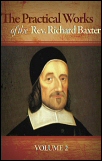
A Christian Directory remains one of Baxter’s most influential works, because it links the doctrine of justification with the outward evidence of forgiveness, manifested in ethical behavior and human experience. Volume Two of The Practical Works of the Rev. Richard Baxter contains the first of four parts of A Christian Directory.
This volume is devoted to Christian ethics. Baxter warns against acceptance of religion for its novelty or convenience. Christianity, he argues, entails significant responsibility for sin and suffering, a large dose of church controversy, and an ample amount of godly behavior. He encourages his readers to live with a keen awareness of the sustaining and sanctifying power of the Holy Spirit, and the manifestation of grace in the lives of believers through godly behavior.
Part two of A Christian Directory continues in Volume Four of The Practical Works of the Rev. Richard Baxter.
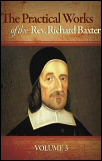
Perhaps one of the must universal human experiences is found in the stark realization that each one of us will die. How we confront the reality of death is deeply informed by our worldview and belief system; Christianity has much to say about death.
Volume Three of The Practical Works of the Rev. Richard Baxter contains Baxter’s writings on death. The Last Work of a Believer is derived from a eulogy Baxter delivered at the funeral of one of his dear friends and congregants. Death inspired Baxter to reflect on his own death and the broadly shared experience of knowing and loving individuals who have died. He turns to the words of Paul, and compares life to a race that must be run, in full acknowledgment of Christ as the author and perfecter of faith. In the meantime, our tasks include studying, preaching, praying, and avoiding activities which divert our attention—lust, ambitions, and the quest for power.
Baxter’s honest reflections on death emphasize the central themes of the Gospel—resurrection, life, and salvation—in the face of human suffering, doubt, and loss.

Volume Four of The Practical Works of the Rev. Richard Baxter contains the second part of A Christian Directory. In this volume, perhaps more explicitly than anywhere else, Baxter links practical Christian ethics with the doctrine of justification, earning Baxter the reputation of a maverick among prominent Protestant theologians in the decades following the Reformation.
Baxter writes extensively on family life, marriage, and social relationships—all in relation to the church. He gives practical advice about how to conduct family devotions, how to provide for a child’s education, how to wisely spend time, and how to maintain a stable and sustainable household. Yet his ethics remain connected to theology, because a stable family and a well-ordered society provide the best context for a right relationship with the church and a right relationship with God.
This volume also includes Baxter’s works on liturgical topics, such as the place of prayer in public worship and the benefits of the sacrament of the Lord’s Supper.

Volume Five of The Practical Works of the Rev. Richard Baxter contains the third part of A Christian Directory, which covers what Baxter calls “Christian Ecclesiastics.”
In this volume, Baxter writes about meaningful worship and the right end of worship. He also articulates the connection between covenant theology and corporate worship, including baptism and profession of faith and the communal affirmation entailed in both. Worship, says Baxter, helps us keep our obligations toward one another.
The role of pastors endured an identity crisis in the years following the Reformation, as Protestants attempted to understand the relationship between ministers and their congregants apart from the authority of Rome. Baxter writes at length about ecclesiastical authority, the history of the episcopacy, the duty of individuals toward their pastors, and the ministerial office itself. Baxter also attempts to address the central issues faced by Protestant ministers: Do individuals need to be re-baptized? How do Protestants define and relate to the communion of saints? Should ministers be re-ordained? How do Protestants define church authority? What should the future relationship between Protestants and Catholics look like? This practical guide navigates through difficult ecclesiological issues which have lingered in the centuries following Baxter’s original writing.
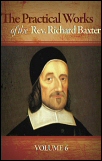
Volume Six of The Practical Works of the Rev. Richard Baxter contains the fourth part of A Christian Directory, which includes Baxter’s writings on the relationship between Christianity and politics.
Baxter defines Christian engagement in politics as a duty—toward neighbors, fellow-citizens, and political and ecclesiastical authority figures. He offers advice about how to respect government officials when their decisions conflict with the teachings of the church, and reminds his readers that the church exists within a society of relationships. Maintaining right relationships with one another—both inside and outside of church—allows individuals who disagree with one another to co-exist peacefully.

In Volume Seven, Baxter attempts to understand the process of conversion and the nature of the unconverted. A Call to the Unconverted to Turn and Live, first published in 1658, became Baxter’s most influential and widely-read work. In the words of one historian, “This slim volume was credited with the conversion of thousands and formed one of the core extra-biblical texts of evangelicalism until at least the middle of the nineteenth century.”
Baxter defines conversion as a simultaneous change of mind and change of heart—oriented toward new intentions, new choices, new aspirations, all of which stem from a newfound awareness of the contrast between sin and salvation. He also asked timely questions about the unconverted: Does God love them? How should the church respond to them? What has hindered them? The impact and legacy of A Call to the Unconverted to Turn and Live testifies to its relevance for the church in any age.
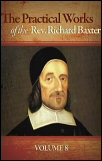
Volume Eight continues Baxter’s works on conversion. In this volume, he directly addresses the unconverted, and attempts to persuade them to change their minds. He also confronts weak Christians about their lackluster faith and for their lifestyle uncharacteristic of their belief in God. He encourages both the converted and unconverted toward honesty and stability, and includes a strongly-worded reminder of God’s requirements.
Volume Eight concludes with a lengthy description of the character of strong, sound Christians.
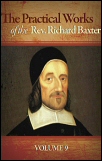
The first part of Volume Nine includes Baxter’s treatises on conscience. The Reformation and its articulation of the doctrine of election left many Protestants worried about their eternal status. In The Right Method for a Settled Peace of Conscience and Spiritual Comfort, Baxter encourages his readers to build a strong faith by understanding the degree of God’s work, but he acknowledges that everyone is prone to doubt and needs constant reminders of their conversion.
The second part of Volume Nine contains a lengthy treatise on Galatians 4:14: “But God forbid that I should glory, save in the cross of our Lord Jesus Christ, by whom the world is crucified unto me, and I unto the world.”
Volume Nine concludes with a treatise on the implications of Christ’s crucifixion for the world. Baxter also discusses the relationship between the physical realm and the spiritual realm, including advice for his readers to temper worldly possessions and carnal desires.
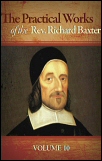
Volume Ten contains Baxter’s work on godly living, entitled A Saint or a Brute. He attempts to discern the signs of true godliness and examples of godly living. Baxter implores his readers to resist hypocrisy, to keep covenants, and to set for themselves higher and more noble goals. Echoing themes from A Christian Directory, Baxter calls Christians to set themselves apart by living well and making better choices—as signs of their sanctification.
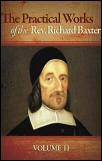
The first part of Volume Eleven includes Baxter’s Treatise of Self-Denial, in which Baxter cautions readers against partiality toward worldly judgment, individual needs, and selfish concerns. As a remedy, he implores readers to learn how to live in self-denial and avoid the possessions and activities which detract from the goals of Christian living.
In Obedient Patience, Baxter defines true patience and provides examples of the ways patience is expressed in the lives and beliefs of Christians. Impatience can erode an awareness of God’s providence, and leads to pain, injury, oppression, and injustice. True patience, however, precedes a proper understanding of God.
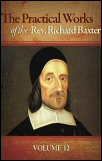
History has turned “justification by faith” into a catchphrase, but Baxter’s writings reaffirm the doctrinal centrality of faith and its link to justification. The Life of Faith in Volume Twelve of The Practical Works of Richard Baxter defines faith and how to achieve certain faith. Baxter addresses the fundamental concern about faith: Why live by faith and not by sight, since the latter favors predictable outcomes? He also writes about the connection between faithlessness and unbelief, and warns against hypocrisy—living by a faith not professed. Baxter concludes by outlining practical ways in which faith can be expressed through prayer, through public worship, and through relationships.
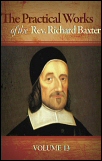
Volume Thirteen contains five shorter theological treatises. Baxter devotes significant attention to the doctrine of God by articulating God’s essence, unity, indivisibility, omnipresence, and eternity. He also connects the immutable and transcendent understanding of God with the immediacy of God’s Spirit and the sources of knowledge through which God reveals himself. Baxter also laments atheism as a direct affront to God’s transcendence and as an offensive contradiction to human knowledge.
Volume Thirteen also includes a treatise on the Sabbath and possible reasons for Christ’s instruction about the Sabbath. Baxter writes at length about the connection between the Sabbath and public worship, and how to observe and honor the Sabbath.
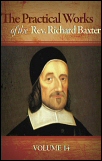
As a lifelong preacher, Baxter wrote extensively on the role of the pastor and on the biblical and historical understanding of the term. Volume Fourteen of The Practical Works of the Rev. Richard Baxter contains The Reformed Pastor, one of the most influential writings on the subject in the period following the Reformation.
The Reformed Pastor is crafted as a how-to guide for pastoral leadership, and includes timeless wisdom for pastors, preachers, teachers, and other church leaders. Baxter explores the metaphor of the shepherd and the flock, and the work involved in the care of sheep—young, weak, and in need of guidance. He also writes at length about the activities of pastoral ministry, such as preaching, prayer, praise, providing instruction, and presiding over the sacraments.
The second part of Volume Fourteen contains Baxter’s writings on confirmation—a topic as hotly debated in the years following the Reformation as it is in churches today. He addresses the status of infants in the church, whether they should be baptized, and the role of children in church life with regard to participation in the sacraments and profession of faith. The process of becoming part of a church is not instant, but entails obligations, accountability, and—most importantly—careful discernment of the work of God and the responsibilities of the church.
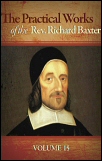
Volume Fifteen contains four shorter theological treatises. Baxter compares and contrasts knowledge and love, and outlines the various degrees of knowledge. He also explains the usefulness of Christian revelation and the relationship between reason and revelation. This volume also includes Baxter’s practical advice for children.
Volume Fifteen concludes with The Reformed Liturgy, Baxter’s broad account of the liturgy in Reformed churches. He writes at length about the sacraments, the role of the catechism in liturgy, the public and corporate confession of sin, and various forms and policies for confronting pastoral and congregational concerns. He also includes a brief appendix which contains a sample liturgy.
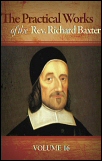
Much of Volume Sixteen is devoted to Baxter’s works on ignorance, drawing from themes in his sermons and elsewhere in his writings. He outlines the problems of self-knowledge and the danger of ignorance, which makes us susceptible to temptation, causes pride, divides the church, and undervalues Christ’s work. Ultimately, ignorance makes us unaware of sanctification and discourages trust in God.
Volume Sixteen concludes with three shorter treatises on the Roman Catholic Church.
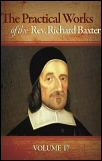
Volume Seventeen includes Baxter’s work on hypocrisy. He attempts to explain the widespread commonality of hypocrisy, contrasted with the marks of grace. He also addresses specific issues pertinent to his own church and the relevant controversies in his own ministry.
Volume Seventeen concludes with a collection of sermons on diverse topics, including Proverbs, Ezekiel, the Gospels, and several sermons on 2 Corinthians.
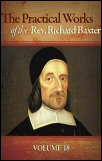
The first part of Volume Eighteen is comprised of sermons Baxter preached at funerals, including Dying Thoughts upon Philippians 1:23, which ponders the immortality of the soul, the intermediate state, and the implications of Christ’s resurrection on the Christian outlook on death. He also writes at length about the communion of saints.
Volume Eighteen concludes with The Mother’s Catechism, a short catechism for parents to use to train their children.
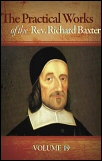
Volume Nineteen contains Baxter’s shorter works for laypersons. The Catechizing of Families answers basic questions about faith and belief, and includes an exposition of the creed, an exposition of the Lord’s Prayer, and comments on each of the Ten Commandments. The Poor Man’s Family Book contains basic instructions about Christian life, such as conversion, repentance, avoiding temptation, and keeping the Sabbath. Baxter also includes forms for prayer, short catechisms for reference and teaching, and numerous summary statements about Christianity. Volume Nineteen concludes with three hymns written by Baxter.
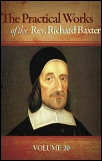
Volume Twenty contains Baxter’s apologetic writings. The Unreasonableness of Infidelity defends the truth of Christianity in four separate discourses. Baxter defends divine revelation against the arrogance of reason, and answers twelve common objections to the reasonableness of Scripture. In the final part of Volume Twenty, Baxter promotes natural religion as a way by which God can be known.
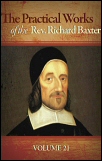
Baxter continues his apologetic defense of Christianity in Volume Twenty-One with The Reasons of the Christian Religion. He argues that humanity is subject to God and God’s laws, and comes to know God through nature and through these laws. He also defends the tenability of supernatural revelation and the credibility of knowledge of God. Despite his ardent defense, Baxter speaks with honesty about the difficulties which faith must overcome.
The volume concludes with answers to twenty-four common objections to Christianity.
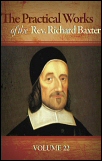
Two of the defining features of Christianity are rest in God and comfort in God’s presence. As one of Baxter’s greatest works—popularized by John Wesley—The Saint’s Everlasting Rest instructs Christians to find rest and comfort in God alone.
The final part of Volume Twenty-Two tackles doubt, and encourages Christians toward diligence. Baxter offers a depiction of heaven as the ultimate end of eternal rest, comfort, and joy.
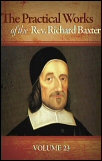
Volume Twenty-Three concludes The Saint’s Everlasting Rest. Baxter addresses the doctrine of the perseverance of the saints, and encourages his readers to compare expectations of life on earth with the promises of heaven. Fearing death leads to doubt and despair, but contemplating heaven brings comfort and rest.
Richard Baxter was born on November 12, 1615 in Shropshire, in England. Although his childhood education was poor, he studied under John Owen between 1629 and 1632, and was converted at the influence of The Bruised Reed, by Richard Sibbes.
After his mother died, Baxter began to study theology, and studied with both John Owen and Francis Garbet. He was ordained in 1638 by John Thornborough and quickly established his reputation as a preacher and pastor. He became involved the Nonconformity movement—a movement which resisted the governance of the Church of England, and he renounced his ordination.
In April, 1641, Baxter began his ministry at Kidderminster, which lasted nineteen years. In addition to his ministry as a preacher and pastor, Baxter initiated many social reforms which earned him a reputation among Presbyterians and Episcopalians as a theological uniter. He wrote The Reformed Pastor during his ministry in Kidderminster.
Baxter moved to Gloucester and Coventry in 1643 to avoid the Civil War, and became chaplain in the army. He returned to London in 1660 where he preached regularly and became politically influential. In 1685, he was sentenced to seven years in prison for his Paraphrase on the New Testament, a charge later rescinded by the government.
Baxter wrote prolifically throughout this lifetime. He is well known for his works on the Roman Catholic Church, his works on conversion, his 4-volume Christian Directory, and A Call to the Unconverted to Turn and Live. Baxter provoked theological controversy for his ecumenism—in stark contrast to the religious warfare of his time—and his rejection of limited atonement. He believed that repentance and obedience affect the outcome of salvation, and that right belief is intricately connected to Christian ethics. Baxter’s covenant theology also contributed to the rise of Puritanism.
Richard Baxter died on December 8, 1691. His last words were, “I have pain…but I have peace.”
Reviews
8 ratings
Ashley Govender
3/26/2024
This is an excellent set. I bought my set as part of the Puritan package. Mine includes the full 23 volumes.
Maxim Farocanag
12/4/2023
I bought a Logos package and this complete works of Baxter is included but to my surprise volume 1 is not included. I have to buy it separately. There must be a mistake. I hope Logos can rectify this.
George Vander Dussen
8/11/2020
Baxter's material is phenomenal! It deserves a 5-star rating. But this Logos edition is riddled with spelling errors. They're the typical OCR spelling errors. That's disappointing.
Kevin Bratcher
6/12/2018

Debra W Bouey
4/29/2017
Brent Rempel
4/16/2014

Christopher Engelsma
8/22/2013

RevSarge
8/5/2013

Thomas Riley
7/16/2013